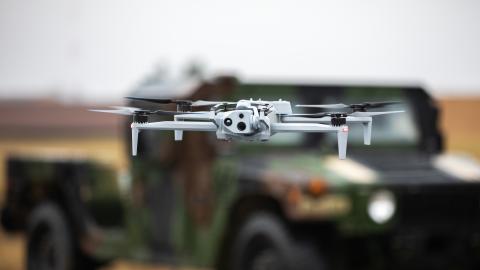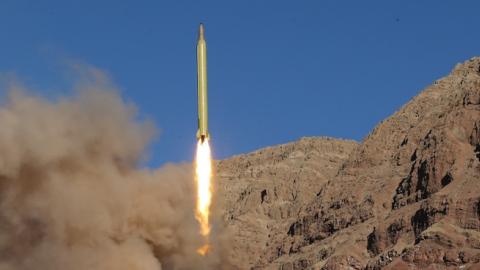Last week, Iran tested ballistic missiles capable of striking American allies in the Middle East. As the Islamic Republic is eager to make clear, Israel is the primary target. The second launch featured the Qadr H, a precision-guided missile with a range of roughly 1,250 miles. The clerical regime stamped the Qadr H with a Hebrew translation of the slogan “Israel must be wiped off the face of the earth"— just so there would be no mistaking the message.
But it's not just Israel that Tehran means to terrorize. As Islamic Revolutionary Guard Corps commander Mohammad Ali Jafari put it, "It is the enemies of the Islamic Revolution and regional security that should be afraid of the IRGC missiles." That is, the IRGC means to scare other Iranian adversaries within range as well as Israel — for instance, Turkey, Jordan, and the Gulf Cooperation Council states, Saudi Arabia most prominent among them.
And the Iranians have an even more important audience in mind — the United States. It's a warning, to President Obama and whoever comes after: Don't mess with Iran.
Iran knows the Obama White House is very unlikely to push back, never mind impose "snap back" sanctions, even though the missile tests violate U.N. Security Council resolutions. It seems that nothing could move this administration to check Iranian aggression. When Iranians set fire to the diplomatic missions of longtime U.S. ally Saudi Arabia, the Obama administration briefed reporters that it was Riyadh's own fault for executing a Saudi Shiite preacher. When the IRGC kidnapped 10 American sailors and violated the Geneva Conventions, the administration insisted the Iranians treated their hostages really super well.
But no matter how much cover the White House has given Iran, no matter how far it has gone out of the way to ingratiate itself with the clerical regime and thereby keep Iran from scuttling the president's beloved nuclear deal, the mullahs still don't think America has been sufficiently humbled. Even if Obama is determined to undo the American order of the Middle East, the Iranians are surrounded by our traditional regional partners, a vestige of American power, whom they seek to intimidate.
In this respect, the Iranians and the Obama White House see the world very differently. Tehran sees it the old-fashioned way: Allies are useful instruments in projecting power. That's why Iran considers Hezbollah a valuable asset and why it's thrilled to partner with Russia in order to save another ally, Syrian dictator Bashar al-Assad.
For Obama, allies are as often as not a nuisance. France and the United Kingdom, as he told the Atlantic's Jeffrey Goldberg last week, are "free riders." Obama thought that David Cameron and Nicolas Sarkozy were going to take the lead on Libya in toppling and replacing Muammar Qaddafi, but, in Obama's telling, the former got distracted and the latter turned out to be a braggart. In other words, Obama was surprised to learn that leading from behind isn't really an option for an American president. Instead of dealing with the world as it is, Obama gets peeved whenever reality doesn't quite conform to his dreams.
For Obama, allies are exasperating, and the worst of the worst are in the Middle East — namely, all those people targeted by the Iranians.
According to the interview with Goldberg, King Abdullah of Jordan expressed reservations about Obama's policies behind his back, and the leader of the free world "told the king that if he had complaints, he should raise them directly."
Recep Tayyip Erdogan used to be a friend until the Turkish leader disappointed Obama by not solving the Syria crisis.
And Israel? Prime Minister Benjamin Netanyahu lectured Obama on the Middle East, and the president bristled because he knows what hardship is like. And why, Obama asked former defense secretary Leon Panetta, does the United States have to ensure Israel's qualitative military edge?
The Saudis, Obama told Goldberg, won't " 'share' the Middle East with Iran" and instead blame Tehran as "the source of all problems." What the Saudis want, Obama complained, is for the United States to use "our military power to settle scores."
Actually, what the Saudis want is the same thing Israel, Jordan, Turkey, France, the United Kingdom, and other U.S. partners around the globe want: to know that their superpower ally stands with them. What they learned last week, if they hadn't already, is that nothing the Iranians do will move Obama to resist. And an interview in which the American president publicly calls out American allies will only reinforce their conviction that they're on their own.
The task for the next White House is to renew not only American strength and credibility but also the character of our foreign policy. How we treat our allies, and how we distinguish them from our adversaries, is how we define who we are in the world and what we stand for.




















